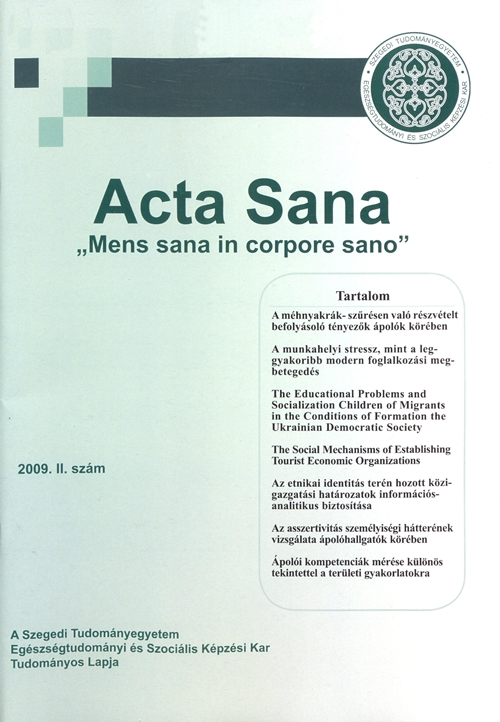A méhnyakrák-szűrésen való részvételt befolyásoló tényezők ápolók körében
##plugins.themes.bootstrap3.article.main##
Absztrakt
Introduction: In Europe cervix cancer is the seventh; and it is the second most frequent
cancer in the age-group of 15-44 years old women. In Europe approximately 321.8
million women live as part of the above mentioned endangered age-group from among
whom 59.931 women are diagnosed with cervix cancer and 29.812 women die of it.
Health workers have an important role in prevention; while practicing their profession
they appear as role models to their patients.
Objectives: The purpose of our research is to reveal how nurses regard their state of
health subjectively, how often they take part in PAP tests and if there is any difference
in the motivation of Hungarian and German nurses to screening tests.
Methods: A self-fill-in questionnaire was used in our cross-section research. The
sample was taken with unknown probability and was formed by nurses from three
hospitals: Frankfurt Diakonie Clinic, Stralsand Nursing Service in Germany and Zala
County Hospital in the West-Transdanubian region of Hungary (N=210). Data processing
was carried out by using SPSS 17.0 for Windows version. As in descriptive statistics
we calculated average, standard deviation, frequency, odds ratio, correlation; as in
mathematical statistics we used x2 tests; differences were considered to be significant
by the value of p<0.05.
Results: A significantly big rate of the respondents regarded their health status as good.
The average age of the first appearance on gynaecological screening tests was 22.31±7
years. 86.1% of the respondents participates in PAP tests within 1-3 years: 68.1% of
them every year, 12.1% of them every second year and 5.2% of them every third year.
It deserves attention that 15.4 % of the nurses had not been taken part in PAP tests at
all: this rate was 26.5% among the German nurses and 5.5% among Hungarian nurses
(the difference is significant).
Conclusion: Although there is an increase in participating in cancer prevention programs
in Germany and Hungary as well, it is still not satisfactory. Cancer prevention
programs do not identify the role of nurses concretely, however, nurses should have an
important role in fulfilling the aims of these programs, in improving the population’s
health. Nurses have the possibility to support individuals in accepting health protective
and risk decreasing behaviour at all fields of the health care system. Among other things
health education is an independent function of nursing for which one of the most effective
methods could be to set an example.
cancer in the age-group of 15-44 years old women. In Europe approximately 321.8
million women live as part of the above mentioned endangered age-group from among
whom 59.931 women are diagnosed with cervix cancer and 29.812 women die of it.
Health workers have an important role in prevention; while practicing their profession
they appear as role models to their patients.
Objectives: The purpose of our research is to reveal how nurses regard their state of
health subjectively, how often they take part in PAP tests and if there is any difference
in the motivation of Hungarian and German nurses to screening tests.
Methods: A self-fill-in questionnaire was used in our cross-section research. The
sample was taken with unknown probability and was formed by nurses from three
hospitals: Frankfurt Diakonie Clinic, Stralsand Nursing Service in Germany and Zala
County Hospital in the West-Transdanubian region of Hungary (N=210). Data processing
was carried out by using SPSS 17.0 for Windows version. As in descriptive statistics
we calculated average, standard deviation, frequency, odds ratio, correlation; as in
mathematical statistics we used x2 tests; differences were considered to be significant
by the value of p<0.05.
Results: A significantly big rate of the respondents regarded their health status as good.
The average age of the first appearance on gynaecological screening tests was 22.31±7
years. 86.1% of the respondents participates in PAP tests within 1-3 years: 68.1% of
them every year, 12.1% of them every second year and 5.2% of them every third year.
It deserves attention that 15.4 % of the nurses had not been taken part in PAP tests at
all: this rate was 26.5% among the German nurses and 5.5% among Hungarian nurses
(the difference is significant).
Conclusion: Although there is an increase in participating in cancer prevention programs
in Germany and Hungary as well, it is still not satisfactory. Cancer prevention
programs do not identify the role of nurses concretely, however, nurses should have an
important role in fulfilling the aims of these programs, in improving the population’s
health. Nurses have the possibility to support individuals in accepting health protective
and risk decreasing behaviour at all fields of the health care system. Among other things
health education is an independent function of nursing for which one of the most effective
methods could be to set an example.
##plugins.themes.bootstrap3.article.details##
Hogyan kell idézni
Karamán Pakai, Annamária. 2009. „A méhnyakrák-szűrésen Való részvételt befolyásoló tényezők ápolók körében”. Acta Sana 4 (2):6-14. https://ojs.bibl.u-szeged.hu/index.php/actasana/article/view/18403.
Folyóirat szám
Rovat
Cikkek

